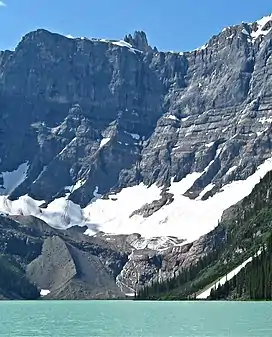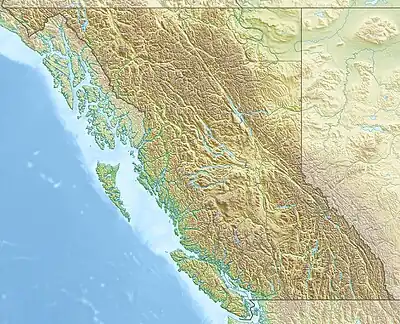| Aiguille Peak | |
|---|---|
 Aiguille Peak from Chephren Lake | |
| Highest point | |
| Elevation | 2,999 m (9,839 ft)[1][2] |
| Prominence | 206 m (676 ft)[3] |
| Parent peak | Howse Peak (3295 m)[3] |
| Listing | |
| Coordinates | 51°48′16″N 116°40′11″W / 51.80444°N 116.66972°W[4] |
| Geography | |
 Aiguille Peak Location in Alberta and British Columbia  Aiguille Peak Aiguille Peak (British Columbia) | |
| Country | Canada |
| Provinces | Alberta and British Columbia |
| Protected area | Banff National Park |
| Parent range | Waputik Range |
| Topo map | NTS 82N15 Mistaya Lake[4] |
| Climbing | |
| First ascent | 1952 by Mr. and Mrs. J.D. Mendenhall[1] |
Aiguille Peak is a peak located on the Canadian provincial boundary of Alberta and British Columbia in Banff National Park. It was named in 1915 by Arthur O. Wheeler.[1][3] "Aiguille" is French for "needle" and is also a mountaineering term for a sharp-ridged summit.[5][6]
Geology
Aiguille Peak is composed of sedimentary rock laid down during the Precambrian to Jurassic periods. Formed in shallow seas, this sedimentary rock was pushed east and over the top of younger rock during the Laramide orogeny.[7]
Climate
Based on the Köppen climate classification, Aiguille Peak is located in a subarctic climate zone with cold, snowy winters, and mild summers.[8] Temperatures can drop below −20 °C with wind chill factors below −30 °C. Precipitation runoff from the peak drains east to the Mistaya River, or west into tributaries of the Blaeberry River.
See also
References
- 1 2 3 "Aiguille Peak". cdnrockiesdatabases.ca. Retrieved 2010-02-08.
- ↑ "Topographic map of Aiguille Peak". opentopomap.org. Retrieved 2021-09-22.
- 1 2 3 "Aiguille Peak". Bivouac.com. Retrieved 2010-02-08.
- 1 2 "Aiguille Peak (Alberta)". Geographical Names Data Base. Natural Resources Canada. Retrieved 2021-09-22.
- ↑ Boles, Glen W.; Laurilla, Roger W.; Putnam, William L. (2006). Canadian Mountain Place Names. Vancouver: Rocky Mountain Books. p. 24. ISBN 978-1-894765-79-4.
- ↑ Place-names of Alberta. Ottawa: Geographic Board of Canada. 1928. p. 10.
- ↑ Gadd, Ben (2008). Geology of the Rocky Mountains and Columbias.
- ↑ Peel, M. C.; Finlayson, B. L.; McMahon, T. A. (2007). "Updated world map of the Köppen−Geiger climate classification". Hydrol. Earth Syst. Sci. 11: 1633–1644. ISSN 1027-5606.
External links
- Aiguille Peak close-up photo: Flickr
- "Aiguille Peak". BC Geographical Names.